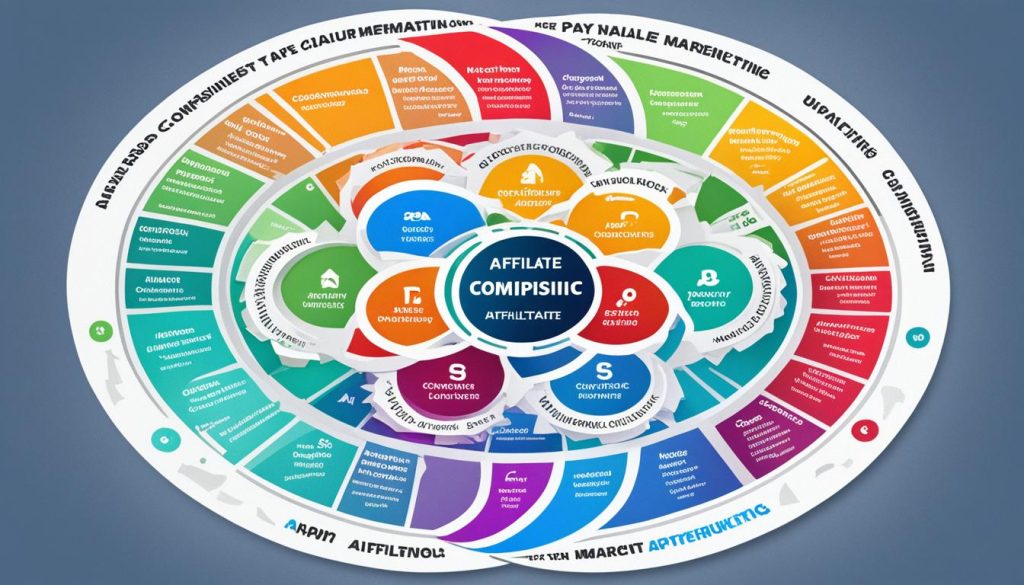Ever wondered how top bloggers and social media stars make a lot of money? The answer is affiliate marketing. It’s a way for creators to make money from their content and work with brands.
Did you know over 80% of brands use affiliate marketing? This means a big chance for bloggers, podcasters, and influencers to make money. But what is this model, and how can you benefit from it?
This guide will explain affiliate marketing, its different models, and how to earn commissions. You’ll learn how to make a steady income from your blog or social media. Get ready to boost your earnings and grow your online presence.
The Concept of Affiliate Marketing
Affiliate marketing has changed how companies and individuals work together to make sales and earn money. It’s a partnership between a merchant and affiliates. The merchant offers products or services. Affiliates promote these to their audience and get a commission for each sale.
What is Affiliate Marketing?
Affiliate marketing is a way for companies to pay others to help sell their products and services. These people, called affiliates, try to find new customers for the company. They do this to earn a commission on any sales they help make.
How Affiliate Marketing Works
The internet has made affiliate marketing very popular. A great example is Amazon’s affiliate program. Websites and bloggers can earn money by linking to Amazon and getting a cut of the sales they generate. This makes affiliate marketing a pay-for-performance strategy. It lets companies sell their products through a network of affiliates.
| Affiliate Marketing Participants | Role |
|---|---|
| Merchant | Offers products or services and provides the affiliate program |
| Affiliate | Promotes the merchant’s offerings and earns a commission on successful sales |
| Consumer | Purchases the merchant’s products or services through the affiliate’s referral |
Benefits of Affiliate Marketing for Bloggers
As a blogger, affiliate marketing is a great way to make more money. It’s perfect for both new and experienced bloggers. The perks of affiliate marketing for bloggers can really boost your success.
One big plus is earning passive income. You can make money by promoting products on your blog. Even when you’re not writing new posts, you can still earn commissions.
Affiliate marketing for bloggers also builds trust with your readers. By sharing products you trust, you show you care about your audience. This makes you a go-to source for advice in your niche.
It’s another way to make money, not just from ads or direct sales. Affiliate marketing for bloggers opens up more ways to earn. This makes your blog more stable and less risky.
The perks of affiliate marketing for bloggers are many. It can change how your blog grows and makes money. By using affiliate marketing, you can open new income streams, gain trust with readers, and grow your blogging career.

To sum up, the main advantages of affiliate marketing for bloggers are:
- Passive income generation
- Enhanced trust and credibility with your audience
- Diversification of income sources
- Potential for significant earnings growth
Affiliate Marketing Business Models
There are three main types of affiliate marketing: unattached, related, and involved. Each type has its own way of promoting products. Knowing the differences can help you pick the best strategy for your marketing.
Unattached Affiliate Marketing
Unattached affiliate marketing means promoting products that aren’t directly tied to your niche. You act as a general advertiser, showing products to a wide audience. This method can help you reach more people but might take more work to build trust.
Related Affiliate Marketing
Related affiliate marketing focuses on promoting products that match your audience’s interests. You’ve built a following through content like blogs or YouTube. This way, you can easily share products that your audience will like.
Involved Affiliate Marketing
Involved affiliate marketing means making content that includes an affiliate product. This could be a review or a tutorial showing the product’s benefits. By being more engaged with the products, you can gain your audience’s trust and increase sales.
Choosing the right affiliate marketing model depends on your niche and marketing strategy. Look at the pros and cons of each type to find the best fit for you.

Affiliate marketing for bloggers
As a blogger, you can use affiliate marketing to make extra money and make your content more valuable. This method lets you share products and services with your readers and earn money when they buy or sign up. By using affiliate marketing on your blog, you can earn a steady income and help your readers.
Choosing the right affiliate programs is key to success. Look at different networks and brand programs to find products your readers will like. It’s important to be honest with your readers about your affiliate links and give them real, helpful advice.
Writing great content that includes affiliate offers is crucial. Add product mentions, reviews, and tutorials to your blog posts and social media. This way, you can promote products without just trying to sell them. Always tell your readers about your affiliate links and keep your content true to your voice.
Using your social media and email can help spread the word about your affiliate marketing. Share content about products, run special campaigns, and ask your followers to click on your links. Building a strong connection with your audience and keeping them engaged will help you get more traffic and sales.
Affiliate marketing can be a big money-maker for bloggers of any size. By picking the right partners, making great content, and promoting your products well, you can make more money and give more value to your readers.

| Affiliate Marketing Strategies for Bloggers | Benefits |
|---|---|
| Choosing the Right Affiliate Programs | Aligning with your niche and audience interests |
| Creating Compelling Content | Providing value while seamlessly promoting products |
| Leveraging Social Media and Email | Amplifying reach and driving more traffic and conversions |
| Building Trust with Audience | Ensuring transparency and authenticity in recommendations |
Getting Started with Affiliate Marketing
If you’re a blogger wanting to dive into affiliate marketing, start by picking the right affiliate programs. These should match your niche and audience. This choice is key to your success in this profitable field.
Choosing the Right Affiliate Programs
Think about these things when picking affiliate programs:
- Commission rates: Search for programs with good commission rates. This affects how much you earn.
- Reputation: Go for programs known for being trustworthy. This builds trust with your readers and boosts sales.
- Marketing materials: Choose programs that offer quality banners, images, and content. This makes promoting easier for you.
Creating Content for Affiliate Marketing
After picking your affiliate programs, create content that highlights the products or services. The goal is to add value for your audience, not just sell. Include product reviews, tutorials, comparisons, and other content that shows the product’s benefits. Always be clear about your affiliate links with your audience.
By taking these steps, you’re on your way to starting your affiliate marketing journey. You’ll be building a successful online business.
Promoting Affiliate Products
As a blogger, you have a powerful platform to promote your affiliate products and drive sales. Use the power of social media to your advantage. Share product info, reviews, and special offers on Instagram, TikTok, and YouTube. This way, you can reach more people and keep your followers engaged. Being consistent and providing value on these platforms can boost your affiliate marketing earnings.
Email marketing is also key for affiliate success. Build a strong email list and send targeted promotions and updates. Make sure your emails offer value, like educational content or tips. This helps turn leads into sales.
| Social Media Platforms | Key Strategies |
|---|---|
| Share product photos, stories, and videos with affiliate links | |
| TikTok | Create engaging, short-form content highlighting affiliate products |
| YouTube | Produce product reviews, tutorials, and educational content with affiliate links |

The secret to great affiliate marketing is giving value to your audience. This can be through informative content, personalized advice, or special deals. Use social media and email marketing to promote your products well. This way, you can make the most of your affiliate marketing efforts.
Tracking and Analyzing Affiliate Performance
Successful affiliate marketers know how key it is to track affiliate marketing performance and analyze affiliate marketing data. This helps them make better choices. By monitoring affiliate marketing success, you can see which products and marketing channels work best. This way, you can use your resources wisely.
Many affiliate networks and programs offer detailed reports and analytics. These tools track things like click-through rates, conversion rates, and how much you earn. They also look at the return on investment (ROI) of your campaigns.
To improve your affiliate marketing, keep an eye on these important metrics:
- Click-through rate (CTR) – the percentage of visitors who click on your affiliate links
- Conversion rate – the percentage of visitors who buy something or complete a desired action after clicking your link
- Average order value (AOV) – the average amount customers spend when they buy through your affiliate link
- Commission earned – the total commission you’ve made from your affiliate sales
- Return on investment (ROI) – the ratio of your net profit from affiliate marketing to the cost of those efforts
By watching these metrics closely, you can see which products and marketing channels do well. This lets you adjust your strategy to maximize your affiliate marketing earnings. It also helps you achieve better results for your blog or website.
![]()
Maximizing Affiliate Marketing Earnings
As a blogger, your main goal is to maximize your affiliate marketing earnings. You can do this by using smart strategies. Think about negotiating higher commissions and diversifying your income streams.
Negotiating Higher Commissions
If you’re bringing in a lot of sales or leads, you might get better commission rates. Many programs offer special deals to their top affiliates. Show them how valuable you are and you could get better commission deals.
Diversifying Income Streams
Another way to boost your earnings is to diversify your income streams. Don’t just stick to one affiliate program. Promote different products that your audience will like. This reduces risk and opens up more growth opportunities.
To diversify your affiliate income streams, always try out new products. Make sure your content is the best it can be. Build strong relationships with your affiliate partners. Use your data to find the best opportunities and use your resources wisely.
By using these strategies, you can keep increasing your affiliate marketing earnings. Keep focusing on giving value to your audience. Always look for new ways to make money from your blog.
Legal and Ethical Considerations
As an affiliate marketer, it’s key to know the legal and ethical rules that apply. The Federal Trade Commission (FTC) has set rules to make sure you’re open and honest with your audience. These rules help protect consumers from being misled.
You must tell people you’re an affiliate when you promote products. The FTC says you need to be clear about your connection with the retailer. This lets your audience make smart choices about what you recommend.
It’s also important to not make false claims about what you’re promoting. You should give honest and fair info. This way, your audience can trust your advice.
Staying ethical means following the rules of your affiliate programs too. This means respecting their guidelines, keeping customer data safe, and not doing anything that could be seen as dishonest.
By following legal requirements for affiliate marketing, ethical guidelines for affiliate marketing, and sticking to FTC regulations for affiliate marketing, you can build a successful business. This approach helps you gain trust and credibility with your audience.
| Legal Requirement | Description |
|---|---|
| Disclosure | Clearly and conspicuously state your affiliate relationship with the retailer. |
| Truthful Representation | Avoid making false or misleading claims about the promoted products or services. |
| Compliance with Affiliate Program Terms | Adhere to the guidelines and policies set by the affiliate program you’re participating in. |
Success Stories and Case Studies
Many bloggers and content creators have found success in affiliate marketing. For instance, GearLab is a top site for outdoor gear reviews. It has become a go-to for product advice, making good money from affiliate links. This shows how affiliate marketing can be a big money-maker for bloggers with a strong following.
Buzzfeed’s Buzzfeed Shopping is another great example. It reviews products and services, making money from sales on its site. This shows how affiliate marketing can fit right into content-focused websites, helping readers and making money for the site.
These affiliate marketing success stories and case studies of successful affiliate marketers show the big chances out there for bloggers. By making great content and promoting the right products, they can turn their hobbies into successful, profitable affiliate marketing businesses.
The secret to success in affiliate marketing is having a loyal audience. It’s about knowing what they like and offering them great product tips. By mixing great content, trust, and smart partnerships, bloggers can really make the most of affiliate marketing. This way, they can make a steady income from their online work.
Affiliate Marketing Trends and Future Outlook
The affiliate marketing industry is changing fast. New trends and tech are making a big impact. Influencer marketing is getting more popular, where brands work with social media stars to promote products. Also, mobile-optimized content is key, since more people use their phones to check out affiliate links.
AI and machine learning are becoming big in affiliate marketing’s future. They help make campaigns better, personalize experiences, and make smart choices based on data. This makes affiliate programs work better.
As affiliate marketing grows, it will be more important for brands. Bloggers who keep up with these changes and adjust their strategies will do well. They’ll be ready to take advantage of the industry’s growth.
Key Affiliate Marketing Trends
- Influencer marketing
- Mobile-optimized content
- AI and machine learning for optimization and personalization
- Data-driven decision making
- Diversified income streams
- Stronger partnerships between affiliates and brands
As affiliate marketing’s future unfolds, it’s important to stay ahead. Adapting your tactics will help bloggers earn more and grow with the industry.
Resources for Aspiring Affiliate Marketers
As an aspiring affiliate marketer, you’ll find many resources to help you succeed. Affiliate networks and programs offer educational content, webinars, and training. These help partners improve their marketing skills.
There’s also a strong online community of experienced affiliate marketers. They share their knowledge and tips on forums, blogs, and social media. These places are great for learning, getting inspired, and making connections in affiliate marketing.
You’ll discover many tools and software to make affiliate marketing easier. These include things like link management, tracking performance, creating content, and optimizing it. Using these tools can help you grow your knowledge, improve your skills, and increase your earnings in affiliate marketing.

